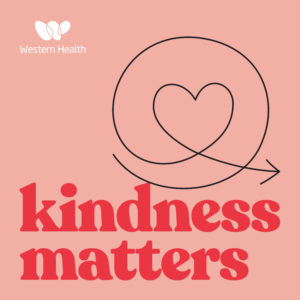
I am pleased to be able to issue this update on the first day the new Victorian case numbers have dipped below 200 since mid July. I hope this will provide many of you – and your family – with a welcome sense of some relief.
Today I will provide you with some information on: some changes in the way you can access our Employee Assistance Program through Caraniche; some tips on the importance of kindness – to others and to yourself – during these unusual and challenging times; and provide some useful links on financial assistance because we are all aware that the COVID pandemic is not only impacting the health of many in our community – it is also affecting the financial health of thousands of families.
Accessing the Employee Assistance Program
In line with new guidelines from DHHS, our Employee Assistance Program provider, Caraniche, is no longer able to provide face to face meetings, so all of their sessions will be conducted by Zoom.
As of Monday 24 August, you will need to contact Caraniche directly to make a booking or alternatively you can use their online booking service. (Please note that the booking service is only monitored during business hours.)
If your matter is urgent and you need to reach out to someone immediately, please phone the direct line to get access to someone 24/7.
Contact Details:
Phone: 1800 099 444 (available 24 hours a day, 7 days)
Online booking: https://work.caraniche.com.au/make-a-booking/
If you require assistance but don’t feel you wish to contact Caraniche, please speak with your line manager, send an email to wellbeingsupport@wh.org.au or call Leonie Hall on 0407 306 611, who can discuss options for referral.
For those who are unfamiliar with Caraniche and the services they offer, you may like to read this firsthand account from one of our medical registrars, Dr Ines Pedro Vaz. Here are some extracts:

Ines has worked as a Registrar in Sunshine ED since July 2019 and is now joining ICU Footscray as a HMO.
She sought help through Western Health’s Employee Assistance Program(EAP) and encourages colleagues to look after their mental health.
“The number one thing is to acknowledge the emotions and know you are not alone. Not everybody will feel comfortable saying it out loud or sharing it at their workplace but it’s important that within yourself, you try to figure out whether you do need that extra help and what format will help you the most,” Ines says.
“I think the important thing here is to just know that everybody at some point will have felt the same and that there really isn’t anything to be ashamed of, and if anything it’s an extremely human, natural reaction to what we have been going through.”
Ines’ first contact with EAP provider Caraniche happened by chance at the Wellness Hub after she’d finished a night shift. Speaking to a Caraniche representative there made her want to pursue formal counselling over the phone a few weeks later.
“I don’t think you can really replace one-to-one counselling. They (Caraniche) are extremely professional, really easy to get hold of, they are actually fantastic. The whole process was super easy from the moment I emailed them.
“I initially felt really guilty that I was struggling. I still had my health, job security, my home to go to and I had supportive family and friends, yet I felt so overwhelmed. Guilt was the main thing I shared with the counsellor in the beginning and she said that is the most common to be feeling this way when you think you should be the one keeping the boat afloat. But you shouldn’t. You should embrace what is happening and acknowledge that it is OK to have points of weakness.
“We stop ourselves from going further in terms of mental health support because we don’t think we deserve it and other people deserve it more. What Western Health is doing is saying ‘You not only deserve it, you need it. Here are the resources, please use them.’ It helps to know that someone has your back and is trying their best to keep you safe.”
Wellbeing Hubs
Please note as another avenue of support for our staff during this challenging time, we have our social work and psychology team supporting the hubs from 2pm to 4pm each day.
As the numbers of people with coronavirus remains high and the restrictions to the way we live and work are ever increasing, it may be difficult to remain positive. Now more than ever it is important to be kind to yourself and to those around you to help us all get through these challenging and difficult times.
Being Kind to Yourself
Many of us struggle to treat ourselves with kindness. In fact we are often nicer to others than ourselves. Being kinder to yourself can help you to feel more positive and boost both your mood and your self-esteem, whilst negative thinking and harsh self-criticism can actually elevate feelings of stress and anxiety.
Apart from taking care of yourself physically by exercising regularly, getting good sleep and eating a balanced diet, here are some other ways that you can support and be kind to yourself:
- Show yourself compassion – when things aren’t going well, ask yourself ‘How would a friend support me in this situation’ and then support and talk to yourself like a good friend would.
- Don’t criticise yourself – Instead of saying things like, ‘How could I have done this? I’m such an idiot!’ you might say, ‘I had a moment of absent-mindedness and that’s okay—it could have happened to anyone’.
- Focus on your good qualities – write down 3 things you appreciate about yourself. They don’t have to be about big achievements – that you’re a good listener, kind to others, a good cook etc.
- Allow yourself to feel your emotions – it’s okay to have feelings of being disappointed, lonely or sad during this time. Feel the sadness. Cry or yell for a minute. Then intentionally focus on the things you are grateful for. You could try writing down 3 things that you are grateful for every day.
- Try to put less stress and pressure on yourself – Think again about unrealistic standards you’ve set for yourself, like “I have to finish this project today.” Regular breaks will stop you burning out and mean you can be more productive, so they’re not a ‘waste of time’.
Being Kind to Others
Kindness promotes empathy and compassion; which in turn, leads to a sense of interconnectedness with others. When we practice random acts of kindness, it generates positivity. We feel better and the recipients of our acts feel better, which then makes them more likely to be kind to other people.
Being kind does not have to involve big gestures. It can be as simple as:
- Smiling at people as you walk past – even with a mask on, you can usually tell someone is smiling
- Treating someone to a coffee or tea, particularly if you see they are not having a good day
- Thanking someone you appreciate
- Helping a patient or visitor navigate where they need to get to
- Asking a colleague how they are
- Taking the time to listen to someone
All of us can make a big difference by doing the little things that matter every day!
Resources:
Self-care – being kind to yourself
Why random acts of kindness matter to your wellbeing
Financial Assistance
Some families may have been negatively impacted financially by the latest restrictions. To learn about how this can be managed please review the content on the Money Smart website. It contains information about:
- Accessing your super
- Financial assistance
- Living on a reduced income
- Getting debt under control
- Keeping your mortgage on track
- Super and shares
- Urgent help with money
Building Resilience
Building coping skills and resilience may help you work through the emotional upheaval triggered by the coronavirus.
Resilience is the process of adapting in the face of adversity, trauma, tragedy, or other significant sources of stress. Some people refer to resilience as “bouncing back,” but it’s more than that. Being resilient includes learning from past experiences and developing new coping strategies moving forward.
Like building a muscle, increasing your resilience requires time and dedication. If you don’t put in the work, it might atrophy. People are conditioned to think of resilience as a personality trait (either you have it or you don’t), but this isn’t the case. With intention and practice, you can become more resilient, no matter your age.
Click here to view the key steps to building resilience.
Regards
Suellen
On behalf of the Executive Team
